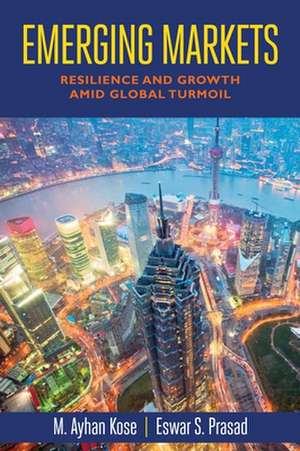Emerging Markets: Resilience and Growth amid Global Turmoil
Autor M. Ayhan Kose, Eswar S. Prasaden Limba Engleză Paperback – 11 noi 2010
Emerging market economies (EMEs) have become the darlings of international investors and the focus of enormous attention in academic, media, and policy circles. M. Ayhan Kose and Eswar Prasad present the definitive account of the evolution of EMEs and use the lens of the global financial crisis to evaluate their strengths and weaknesses.
Led by a set of large and dynamic countries—including Brazil, China, India, and Russia—EMEs have become a dominant presence in the world economy. They now account for a substantial share of world output and have been a major driver of global growth during the past decade. They are significant players in international trade and financial flows and are beginning to exert rising clout in global policy debates. However, the financial crisis of 2007–09 and the worldwide recession that followed cast a pall over the notion that EMEs had become self-reliant and "decoupled" from demand conditions in and financial flows from advanced countries.
Kose and Prasad, prominent experts on emerging market economies and globalization, draw on their extensive research to assess the resilience of EMEs in the face of the global financial crisis. Their analysis shows that EMEs, as a group, weathered the crisis much better than the advanced countries, and most of these economies have bounced back rapidly from the global recession. The authors track down the reasons for this resilience and explain why some countries in this group have done better than others. Based on this analysis, they draw lessons for the durability and sustainability of these economies' long-term growth. This book is important reading for anyone trying to anticipate the future growth of emerging markets or contemplating business opportunities in these economies.
Led by a set of large and dynamic countries—including Brazil, China, India, and Russia—EMEs have become a dominant presence in the world economy. They now account for a substantial share of world output and have been a major driver of global growth during the past decade. They are significant players in international trade and financial flows and are beginning to exert rising clout in global policy debates. However, the financial crisis of 2007–09 and the worldwide recession that followed cast a pall over the notion that EMEs had become self-reliant and "decoupled" from demand conditions in and financial flows from advanced countries.
Kose and Prasad, prominent experts on emerging market economies and globalization, draw on their extensive research to assess the resilience of EMEs in the face of the global financial crisis. Their analysis shows that EMEs, as a group, weathered the crisis much better than the advanced countries, and most of these economies have bounced back rapidly from the global recession. The authors track down the reasons for this resilience and explain why some countries in this group have done better than others. Based on this analysis, they draw lessons for the durability and sustainability of these economies' long-term growth. This book is important reading for anyone trying to anticipate the future growth of emerging markets or contemplating business opportunities in these economies.
Preț: 259.89 lei
Nou
Puncte Express: 390
Preț estimativ în valută:
49.74€ • 51.73$ • 41.06£
49.74€ • 51.73$ • 41.06£
Carte tipărită la comandă
Livrare economică 14-28 aprilie
Preluare comenzi: 021 569.72.76
Specificații
ISBN-13: 9780815705642
ISBN-10: 0815705646
Pagini: 210
Ilustrații: Illustrations
Dimensiuni: 152 x 229 x 15 mm
Greutate: 0.39 kg
Editura: Brookings Institution Press
Colecția Brookings Institution Press
ISBN-10: 0815705646
Pagini: 210
Ilustrații: Illustrations
Dimensiuni: 152 x 229 x 15 mm
Greutate: 0.39 kg
Editura: Brookings Institution Press
Colecția Brookings Institution Press
Notă biografică
Eswar Prasad holds the New Century Chair in International Economics. He is the Tolani Senior Professor of Trade Policy at Cornell University and a Research Associate at the National Bureau of Economic Research. He was previously head of the Financial Studies Division and the China Division at the IMF.
M. Ayhan Kose is assistant to the director in the International Monetary Fund's Research Department. He previously served as an economist for the United States and Canada desks of the IMF. He is the coeditor of the IMF Economic Review, the editor of the IMF Research Bulletin, and an executive editor of the Journal of Asian Economics.
M. Ayhan Kose is assistant to the director in the International Monetary Fund's Research Department. He previously served as an economist for the United States and Canada desks of the IMF. He is the coeditor of the IMF Economic Review, the editor of the IMF Research Bulletin, and an executive editor of the Journal of Asian Economics.
Descriere
Emerging market economies (EMEs) have become the darlings of international investors and the focus of enormous attention in academic, media, and policy circles. M. Ayhan Kose and Eswar Prasad present the definitive account of the evolution of EMEs and use the lens of the global financial crisis to evaluate their strengths and weaknesses.
Led by a set of large and dynamic countries—including Brazil, China, India, and Russia—EMEs have become a dominant presence in the world economy. They now account for a substantial share of world output and have been a major driver of global growth during the past decade. They are significant players in international trade and financial flows and are beginning to exert rising clout in global policy debates. However, the financial crisis of 2007–09 and the worldwide recession that followed cast a pall over the notion that EMEs had become self-reliant and "decoupled" from demand conditions in and financial flows from advanced countries.
Kose and Prasad, prominent experts on emerging market economies and globalization, draw on their extensive research to assess the resilience of EMEs in the face of the global financial crisis. Their analysis shows that EMEs, as a group, weathered the crisis much better than the advanced countries, and most of these economies have bounced back rapidly from the global recession. The authors track down the reasons for this resilience and explain why some countries in this group have done better than others. Based on this analysis, they draw lessons for the durability and sustainability of these economies' long-term growth. This book is important reading for anyone trying to anticipate the future growth of emerging markets or contemplating business opportunities in these economies.
Led by a set of large and dynamic countries—including Brazil, China, India, and Russia—EMEs have become a dominant presence in the world economy. They now account for a substantial share of world output and have been a major driver of global growth during the past decade. They are significant players in international trade and financial flows and are beginning to exert rising clout in global policy debates. However, the financial crisis of 2007–09 and the worldwide recession that followed cast a pall over the notion that EMEs had become self-reliant and "decoupled" from demand conditions in and financial flows from advanced countries.
Kose and Prasad, prominent experts on emerging market economies and globalization, draw on their extensive research to assess the resilience of EMEs in the face of the global financial crisis. Their analysis shows that EMEs, as a group, weathered the crisis much better than the advanced countries, and most of these economies have bounced back rapidly from the global recession. The authors track down the reasons for this resilience and explain why some countries in this group have done better than others. Based on this analysis, they draw lessons for the durability and sustainability of these economies' long-term growth. This book is important reading for anyone trying to anticipate the future growth of emerging markets or contemplating business opportunities in these economies.









